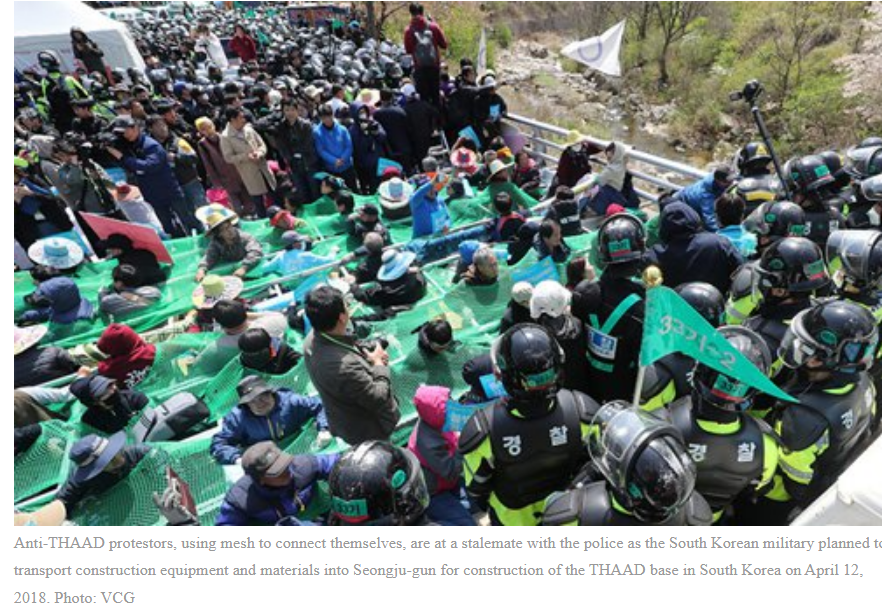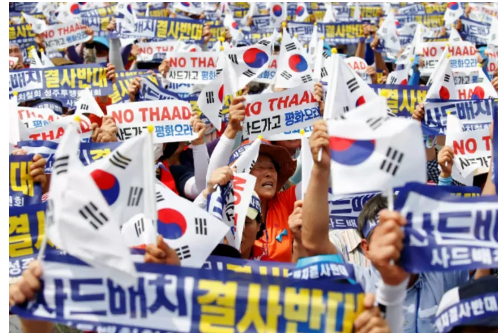The Republic of Korea: Back in the US Fold
Written by: (Contributed) on 3 July 2023
The decision by the South Korean (ROK) government to activate a sensitive US-THAAD system has placed the presidential administration of Yoon Suk-yeol closer to the Pentagon; the ROK is now a major player in the US-led Indo-Pacific Strategy.
The previous presidential administration of Moon Jae-in, however, was more reluctant to actively side with the US, to prevent a confrontational diplomatic position with China.
The ROK, subsequently, has become increasingly divided, between those who want a more conciliatory diplomatic position toward the northern DPRK and China, and those who support the present US-led Cold War on the Korean peninsula.
The announcement from the Blue House in Seoul that the US THAAD missile defence system had been given the all-clear for activation next year has raised diplomatic tensions on the Korean peninsula. It had been initially put into position in May, 2017, shortly before Moon Jae-in took the presidency, although never activated due to health and safety and environmental considerations held by local people. The radar system had sufficient range to reach into the northern DPRK together with China and Russia. (1)
China, specifically, had raised criticism that the radar of the THAAD system could be used for surveillance of China. (2)
The THAAD system is a component part of the US Indo-Pacific Strategy (IPS), based on the US-Japan diplomatic alliance being upgraded to a global alliance. The ROK, which hosts 28,500 US military personnel as part of their Defence of Japan doctrine for rapid deployment in time of war, had been subsequently downgraded to the diplomatic position of a lower-level partner alongside Taiwan, Singapore, Vietnam and others. (3) The ROK was also initially reluctant to provide the US with unconditional guarantees about their participation in the IPS, and the Moon Jae-in administration had sought clarification in writing.
The activation of the US-THAAD system has also formed part of a region-wide missile-defence network, with Australia and Japan as regional hubs for 'US interests'. The foundations of the network were being laid over a decade ago, with a primary responsibility for intelligence-gathering and surveillance. (4)
Further concerns raised by the Moon Jae-in presidential administration included fears of economic retaliation by China, which still remains the ROK's biggest trading partner. It was noted during the period that, 'anti-THAAD sentiment by Chinese consumers affected everything from South-Korean-owned retailers and car-makers to K-pop concerts. Chinese tourism to South Korea plummeted'. (5) The fact that the ROK is reliant upon China for semi-conductors, batteries and rare earths, has meant the Blue House has historically taken a measured stance toward Beijing, as a matter of political expediency. (6)
The Yoon Suk-yeol presidential administration, nevertheless, has proved to be openly pro-US, without acknowledging the likely consequences. While it has been noted that Yoon Suk-yeol 'centred his foreign policy around tighter collaboration with the US and envisioned a relationship with China based on mutual respect', the ROK has become increasingly divided since he took office in March last year. The Yoon Suk-yeol administration has become very unpopular: many ROK people want a more conciliatory diplomatic position toward the DPRK, where they have family members.
It is also important to note a major diplomatic statement about the practicalities of ROK diplomatic relations with China, from Moon Jae-in special advisor, Moon Chung-in. It officially noted that while, 'South Korea is an American ally, and we maintain a strategic co-operative partnership with China … alliance is more important strategic partner … but … we are structurally dependent on China'. (7) The Yoon Suk-yeon presidential administration, however, appear to have rejected the assessment, and all which that entails.
1. Missile defence gets the all clear, Australian, 23 June 2023.
2. South Korea, China clash over US missile shield, Reuters, 12 August 2022.
3. The reasons behind Washington's push for GSOMIA., Hankyoreh, 12 November 2019.
4. See: US seeks new Asia defences, The Wall Street Journal, 24-26 August 2012.
5. Australian, op.cit., 23 June 2023.
6. South Korea and the THAAD dilemma, DEFENCE.info., 6 July 2022.
7. Seoul's balancing act between Beijing and Washington set to remain, The Global Times, 27 May 2021.
Print Version - new window Email article
-----
Go back
Independence from Imperialism
People's Rights & Liberties
Community and Environment
Marxism Today
International
Articles
| Board of Peace: an “upscale golf club” with select membership and hidden agendas |
| Rojava must be saved! Defend Rojava! |
| Greenland: Misusing “intelligence” to justify aggression |
| Statement on Iran |
| ICOR: US imperialism blocks Venezuela and aims for a coup d'état – international solidarity is needed |
| The US and Venezuela, 2025: moves to reassert the Monroe Doctrine |
| The struggle for mastery, and the uses and abuses of power: AI data-centres in outer space, part 2 |
| China winning the economic war with USA |
| Palestinian people's struggle not forgotten |
| Pegasus: US and Israel strengthen connections |
| Japan’s new PM drives tension in our region |
| Indian Maoists reject capitulation and surrender |
| Away with the Yankee presence in the waters of the Caribbean |
| Stop the militarisation of Space |
| The construction of a new Syria |
| US, Israel and Australia: the Indo-Pacific Strategy |
| Statement on the Massacres Committed by the Rapid Support Forces Militias in Bara and El-Fasher |
| US imperialism’s back yard blues |
| Venezuela: Resist Trump’s gangster tactics |
| DFLP to Hold Video Conference on Gaza |
-----


